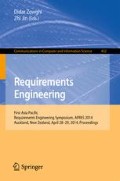Abstract
Non-Functional Requirements (NFR), as its emergence, is a buzzword that is mostly overused while remaining obscure. There is no consensus on what NFR is, how to identify NFR during software development, and what capabilities a desired NFR modeling approach should deliver. To this end, this paper proposes a process-oriented conceptual framework on NFR. It explicitly distinguishes NFR from application-independent domain knowledge, such as quality attributes, tactics, and various constraints, then defines NFR as the composition in specific contexts of domain knowledge and various system abstractions, which include not only the target system, but software models that conceptually define the target system at early stages of software development. Enlightened by the framework, we produce a checklist for NFR identification in the whole development process. We also analyze the methodological implications of our framework and discuss the fundamental capabilities of a desired NFR modeling approach.
Access this chapter
Tax calculation will be finalised at checkout
Purchases are for personal use only
Preview
Unable to display preview. Download preview PDF.
References
Nuseibeh, B., Easterbrook, S.: Requirements engineering: A roadmap. In: ICSE 2000, pp. 35–46. ACM, New York (2000)
Cheng, B.H.C., Atlee, J.M.: Research directions in requirements engineering. In: FOSE 2007, pp. 285–303. IEEE Computer Society Press, Washington, DC (2007)
Software & Systems Engineering Standards Committee: IEEE Std 1061-1998, IEEE Standard for a software quality metrics methodology. IEEE Computer Society, Tech. Rep. (1998)
Sommerville, I., Kotonya, G.: Requirements Engineering: Processes and Techniques. John Wiley & Sons, Inc., New York (1998)
Yeh, R.T., Zave, P., Conn, A.P., Cole, G.E.: Software requirements analysis - new directions and perspectives. In: Vick, C.R., Ramamoorthy, C. (eds.) Handbook of Software Engineering, Van Nostrand Reinhold Co. (1984)
Chung, L., do Prado Leite, J.C.S.: On Non-Functional Requirements in Software Engineering. In: Borgida, A.T., Chaudhri, V.K., Giorgini, P., Yu, E.S. (eds.) Mylopoulos Festschrift. LNCS, vol. 5600, pp. 363–379. Springer, Heidelberg (2009)
Glinz, M.: On non-functional requirements. In: RE 2007, pp. 21–26 (October 2007)
de Boer, R.C., van Vliet, H.: On the similarity between requirements and architecture. Journal of Systems and Software 82(3), 544–550 (2009)
Mylopoulos, J., Chung, L., Nixon, B.: Representing and using nonfunctional requirements: A process-oriented approach. IEEE Transactions on Software Engineering 18(6), 483–497 (1992)
Chung, L., Nixon, B.A., Yu, E., Mylopoulos, J.: Non-Functional Requirements in Software Engineering, 1st edn. The Kluwer International Series in Software Engineering, vol. 5. Springer (October 1999)
Bass, L., Clements, P., Kazman, R.: Software architecture in practice. Addison-Wesley Professional (2003)
Forward, A., Lethbridge, T.C.: Problems and opportunities for model-centric versus code-centric software development: A survey of software professionals. In: MiSE 2008, pp. 27–32. ACM, New York (2008)
Nuseibeh, B.: Weaving together requirements and architectures. Computer 34(3), 115–119 (2001)
Taylor, R.N., Medvidovic, N., Dashofy, E.M.: Software Architecture: Foundations, Theory, and Practice. Wiley Publishing (2009)
Ameller, D., Ayala, C., Cabot, J., Franch, X.: How do software architects consider non-functional requirements: An exploratory study. In: RE 2012, pp. 41–50 (September 2012)
Paech, B., Dutoit, A.H., Kerkow, D., Knethen, A.V.: Functional requirements, non-functional requirements, and architecture should not be separated -a position paper. In: REFSQ 2002, Essen, Germany (2002)
ISO/IEC: ISO/IEC 9126. Software engineering – Product quality. ISO/IEC (2001)
Pohl, K., Böckle, G., Linden, F.V.D.: Software product line engineering: foundations, principles, and techniques. Springer (2005)
Cleland-Huang, J., Marrero, W., Berenbach, B.: Goal-centric traceability: Using virtual plumblines to maintain critical systemic qualities. IEEE Transactions on Software Engineering 34(5), 685 (2008)
Jansen, A., Bosch, J.: Software architecture as a set of architectural design decisions. In: WICSA 2005, pp. 109–120. IEEE Computer Society (2005)
Kruchten, P.: An Ontology of Architectural Design Decisions in Software Intensive Systems. In: 2nd Groningen Workshop Software Variability, pp. 54–61 (October 2004)
Bøegh, J.: A new standard for quality requirements. IEEE Software 25(2), 57–63 (2008)
Kienzle, D., Elder, M., Tyree, D., Edwards-Hewitt, J.: Security patterns repository version 1.0. Technical report (2002)
Fielding, R.T.: Architectural styles and the design of network-based software architectures. PhD thesis, University of California, Irvine (2000)
Mairiza, D., Zowghi, D.: Constructing a catalogue of conflicts among non-functional requirements. In: Maciaszek, L.A., Loucopoulos, P. (eds.) ENASE 2010. CCIS, vol. 230, pp. 31–44. Springer, Heidelberg (2011)
Sandhu, R., Samarati, P.: Access control: principle and practice. IEEE Communications Magazine 32(9), 40–48 (1994)
von Ahn, L., Blum, M., Hopper, N.J., Langford, J.: CAPTCHA: using hard AI problems for security. In: Biham, E. (ed.) EUROCRYPT 2003. LNCS, vol. 2656, pp. 294–311. Springer, Heidelberg (2003)
Wayman, J.L., Jain, A.K., Maltoni, D., Maio, D.: Biometric Systems: Technology, Design and Performance Evaluation, 1st edn. Springer (2010)
Author information
Authors and Affiliations
Editor information
Editors and Affiliations
Rights and permissions
Copyright information
© 2014 Springer-Verlag Berlin Heidelberg
About this paper
Cite this paper
Sun, L., Park, J. (2014). A Process-Oriented Conceptual Framework on Non-Functional Requirements. In: Zowghi, D., Jin, Z. (eds) Requirements Engineering. Communications in Computer and Information Science, vol 432. Springer, Berlin, Heidelberg. https://doi.org/10.1007/978-3-662-43610-3_1
Download citation
DOI: https://doi.org/10.1007/978-3-662-43610-3_1
Publisher Name: Springer, Berlin, Heidelberg
Print ISBN: 978-3-662-43609-7
Online ISBN: 978-3-662-43610-3
eBook Packages: Computer ScienceComputer Science (R0)

